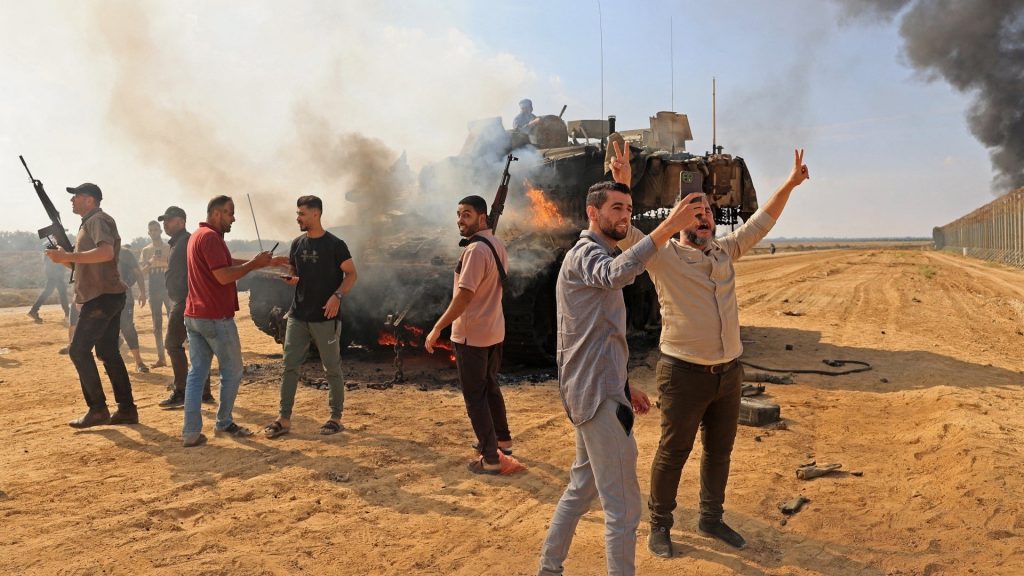
Hamas stunned Israel by launching an attack of unprecedented scale by firing thousands of rockets into the neighbouring nation even as its fighters rampaged through the densely populated civilian enclaves killing hundreds and taking hapless citizens hostages. A report by Gopal Misra
Hamas terrorists, estimated to be around 5000, stunned Israel on Saturday October 7, killing hundreds of its citizens adopting a strategy similar to the one adopted by terrorists during the 2008 Mumbai attack, but on much larger scale and with better precision, rampaging through the densely populated civilian enclaves killing hundreds and taking hapless citizens hostages. The number of casualties is rising with the passage of each day. The death tally has already crossed 1100, and hundreds of civilians wounded.
The death trail is yet to be controlled as the terrorists armed to the teeth have fanned out in the countryside having the support of missiles bombing Israeli positions.
Apart from parading young women naked and killing them, there are reports that young teen-age girls and boys are also being abducted and taken to the Hamas areas to serve them as sex slaves. According to Israeli sources, the abducted people are in a perilous position.
In spite of being signatories to UN Charter and various human rights accords, none among the Muslim countries from the Middle –East to Malaysia and Indonesia, including Turkey and Pakistan, have fought shy of condemning the large scale slaughter of the innocents. Even Russia and China have not condemned Hamas, but have been advising Israel not to hit hard the Hamas enclaves in Ghaza.
However, Indian Prime Minister Narendra Modi, who has been keenly following the Middle-East developments and visited Israel and Palestinian territories in 2017, has extended his country’s support to Israel.
US President Joe Biden has already sent its naval ships to Israel. The UK PM, Rishi Sunaka, French President Macron and many other countries of Europe and Americas have extended support to Israel. The American defence secretary, Lloyd Austin said that his country has also taken steps to augment US Air Force F-35, F-15, F-16, and A-10 fighter aircraft squadrons in the region. The significance of Biden’s decision overrules the observations made by a few leaders of the Democratic Party and the Republicans asking the administration to limit Israel’s response in revenging the aggression.

The repeated appeals of China and Egypt to Israel to restrain its military operations are being considered yet another effort to rescue Hamas from being wiped out. In spite of the ongoing carnage of his countrymen, Israeli PM Benjamin Netanyahu has warned that his country would be facing a “long and difficult war”. The country’s security forces have been battling to drive out the terrorists, while launching deadly retaliatory strikes on the densely populated coastal enclave of the enemy, he asserted.
Meanwhile, apart from pounding the places in Gaza’s densely populated areas, which were used for launching missiles against it, Israel has mobilised its 100,00-strong reserve troops near Gaza. Its army spokesman, Jonathan Conricus, has ssid, “Our job is to make sure that at the end of this war, Hamas will no longer have any military capability to threaten Israeli civilians.” “In addition to that, we are also to make sure that Hamas will not be able to govern the Gaza Strip,” he added.
The attack, however, exposes the weakness of Israel’s intelligence system. The key intelligence agency within Israel is Aman—the Military Intelligence of the Israel Defence Forces —backed by the state-of-the art technology appears to have been fooled by Hamas by relying on old fashioned human-to-human communication without using technology.
Ismail Haniyeh Derails Peace
It is doubtful whether Hamas, which is being led by Ismail Haniyeh, who was elected as the prime minister of Palestinian National Authority (PNA) in 2006. He, however, was dismissed by the PNA chairman, Abbas, and on 15 June 2007 appointed Salam Fayyad as the new PM. Earlier, Ismail Haniyeh had refused to honour the previous agreements, when he was told by USA, Russia, United Nations, and European Union that future foreign assistance to the Palestinian Authority would depend upon the future government’s commitment to non-violence, recognition of the State of Israel, and acceptance of previous agreements.
After being sacked from the Unity Government in 2007 in PNA, Hamas chief Ismail Haniyeh forcefully occupied the Gaza strip. Earlier, in December 2006, he had declared that “We will never recognize the usurper Zionist government and will continue our jihad-like movement until the liberation of Jerusalem”.
Egypt, Jordan, and Saudi Arabia did not approve Hamas policy. In late June 2007, they recognized the West Bank-based cabinet formed by Fayyad as the sole legitimate Palestinian government, and Egypt moved its embassy from Gaza to the West Bank.
In a bid to justify derailing the peace process initiated by Arafat, Haniyeh has been aligning with Iran and radical Muslim clergies in other countries. He also could get support from Iran’s proxy, Hezbollah, a terrorist group active in Syria and Lebanon. During this ongoing conflict, Hezbollah has started attacking Israeli territories adjacent to Lebanon, but Israel may hit back with the latest weapons.
The Oslo Accord
The signatories to the Oslo Accord in 1994, Israeli Prime Minister Yitzhak Rabin, Israeli Foreign Minister Shimon Peres, and PLO Chairman Yasser Arafat, were honoured with the coveted Nobel Peace Prize. The Oslo Accord, one of the most effective agreements for peace in the Middle East provided for the creation of a Palestinian interim self-government, the Palestinian National Authority (PNA).
The PNA was given the responsibility for the administration of the territory under its control, and it also called for the withdrawal of the Israeli forces from parts of the Gaza Strip and West Bank.
It was anticipated that this arrangement would last for a five-year interim period during which a permanent agreement would be negotiated (beginning no later than May 1996). The remaining issues such as Jerusalem, Palestinian refugees, Israeli settlements, security and borders would be part of the “permanent status negotiations” during this period.
Earlier, the two parties had reached an agreement. It was signed by Peres while visiting Oslo. In the Letter of Mutual Recognition, the PLO acknowledged the State of Israel and pledged to reject violence, and Israel recognized the PLO as a representative of the Palestinian people and as a partner in negotiations.
The PLO recognized the right of the state of Israel to exist and renounced terrorism as well as other forms of violence, and its desire for the destruction of the Israeli state.
The Abraham Accords
The Abraham Accords, which laid the foundation of the 2019 Peace Through Prosperity conference in Bahrain, has also paved the process for the normalization of diplomatic relations between Israel and Arab nations.
This time, by all accounts, Israel, Saudi Arabia, and the United States were inching closer towards a transformative three-way deal, which would have seen Israel and Saudi formally recognize each other within a security, defence, and economic partnership with the U.S.
Saudi Crown Prince Mohammed Bin Salman had recently said, Every day we get closer to a deal.’’ Similar sentiments were echoed by Israeli PM Netanyahu too when he stated that he was confident of forging “a historic peace” between his country and Saudi Arabia, with Israeli cabinet ministers already landing in Riyadh to “nurture blossoming ties”.
The political observers believe that the Saturday’s invasion of Israel by Hamas has given a temporary setback to the ongoing peace process in the region, but in the long run both Hamas and its patron, Iran, would be losers.
It is hoped that the peace process might soon bounce back. It is also being stated that the proposed Middle-East Corridor connecting India with Europe might have upset China, but the CPEC (China Pakistan Economic Corridor) is yet to take shape.
It is also stated that the pro-Hamas statements put out by Saudi Arabia and blaming Israel for the Hamas invasion should be seen as a bid to address the gallery. In spite of these public postures, Mohamed Allabar, founder of Emaar Properties and one of the world’s largest commercial builders, says that “the younger generation will not let us continue to be trapped by our past”.
In fact, a number of Saudi leaders might be privately celebrating the fact that Hamas has pushed Iran further toward global rejection.
The Saudi’s recognition of Israeli sovereignty after 75 years of statehood might have undercut Iran’s voice in the Islamic world while uniting two of Iran’s foes. Iranians celebrating the attacks on Israel is indicative of this tie-up, but according to foreign affairs experts, it is going to be short-lived. Except a few rhetorical support, it appears other Arab nations, especially Egypt and Jordan, are not rushing to support Hamas in any substantive ways.
These nations along with the UAE, Bahrain, and Morocco have increased peaceful trade and economic cooperation with Israel over the last few years.
While Russia has been nurturing close ties with Iran in addition to Hamas—including Russian Foreign Minister Sergei Lavrov hosting top Hamas political leadership in Moscow, the invasion might force it to review its proximity with the terrorists.
India may soon be deciding to extend necessary food grains and medical relief to the Palestinians of Gaza Strip facing the brunt of the Israeli bombing following the sudden attacks of Hamas terrorists on October 7. The unfolding human tragedy has already received worldwide attention with the US President Biden offering an assistance of 235 million USD $235m to them. The foreign ministers of the European Union are expected to meet anytime to decide the quantum of humanitarian assistance to the bombs-hit people.
Meanwhile, Spain’s acting foreign minister of Jose Manuel Albares and Scotland’s First Minister Humza Yousaf have stated that Israel’s desire to “protect itself from terror” should not impose collective punishment on more than two million Palestinians in Gaza.”
It is expected that New Delhi would soon be taking a decision to help the war-victims directly or through UN agencies.
India likely to set its peace plan rolling
India’s peace plan is expected to be announced within next few days for immediate cessation of violence in the Middle East by completing the unfinished task of the setting up of an independent Palestine state as per the Oslo Accords of 2004. Hamas leadership, perhaps, prompted by its own political ambitions, had rejected the award signed by Yasser Araat, who had had personal friendship with the then Indian leadership, especially PM, Indira Gandhi.
India is confident that all the concerned parties must for restoring the trust deficit between Hamas, a faction of the Palestinian leadership, and Israel. It is also being claimed that the present Israeli leadership did not implement the accords seriously, if not sabotaged it deliberately.
With the failure of the UN Security Council to initiate the peace process, Indian initiative gets significance. It is believed that the Indian proposals might include a request to the four key players, Iran, Israel, Qatar and Lebanon in this ongoing conflict to begin their discussions without any further delay.












